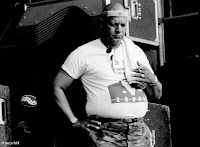Frank Zappa was born in Baltimore, on December 21st of the year 1940. During his childhood, Frank belonged to a middle-low class family. His family moved several times because of his father's job in the Navy and for this reason Frank attended numerous schools. He barely had time to settle sometimes, when it was already time to move again. He wasn't very sociable but with time he assumed the role of the "class clown" in school. He wasn't a good student and he got sick very often, usually depending on the weather. The colder the weather, the worse his health would be.
 |
| Frank and Gail |
 |
| Frank, Moon Unit, Gail, Diva and Dweezil |
 |
| Gail, Moon Unit and Frank |
He was fascinated by horror movies and that's what inspired him later on in his life to make movies himself.
He was an extremely opinionated person, often a mess of contradictions.
Although Frank was diagnosed with terminal cancer in 1990, he did not stop smoking. He said that he didn't believe that all the stories about the evil effects of tobacco were true, "to me, a cigarette is food, and tobacco is my favorite vegetable". Cigarettes and coffee were his fuels.
The last years of his life he concentrated in classical music. He gave several concerts around Europe and had scheduled an opera in Vienna for 1994.
Unfortunately, Frank Zappa the "rock legend" died on 1993 of prostate cancer, still making music, and still smoking.
Some of my favorite Zappa quotes are:
- “Without deviation from the norm, progress is not possible.”
- “A mind is like a parachute. It doesn't work if it is not open.”
- “Without music to decorate it, time is just a bunch of boring production deadlines or dates by which bills must be paid.”
-“I never set out to be weird. It was always other people who called me weird.”
- “Interviewer: 'So Frank, you have long hair. Does that make you a woman?'
Frank Zappa: 'You have a wooden leg. Does that make you a table?”
- “There is more stupidity than hydrogen in the universe, and it has a longer shelf life.”
- “If your children ever find out how lame you really are, they'll murder you in your sleep.”
-“May your shit come to life and kiss you on the face.”
- “The only difference between a cult and a religion is the amount of real estate they own”
Reference:http://www.goodreads.com/author/quotes/22302.Frank_Zappa
Some of my favorite Zappa quotes are:
- “Without deviation from the norm, progress is not possible.”
- “A mind is like a parachute. It doesn't work if it is not open.”
- “Without music to decorate it, time is just a bunch of boring production deadlines or dates by which bills must be paid.”
-“I never set out to be weird. It was always other people who called me weird.”
- “Interviewer: 'So Frank, you have long hair. Does that make you a woman?'
Frank Zappa: 'You have a wooden leg. Does that make you a table?”
- “There is more stupidity than hydrogen in the universe, and it has a longer shelf life.”
- “If your children ever find out how lame you really are, they'll murder you in your sleep.”
-“May your shit come to life and kiss you on the face.”
- “The only difference between a cult and a religion is the amount of real estate they own”
Reference:http://www.goodreads.com/author/quotes/22302.Frank_Zappa






